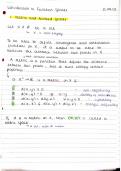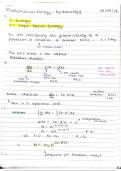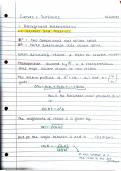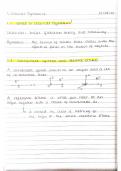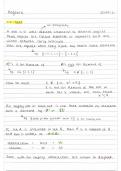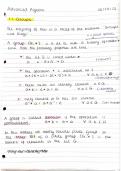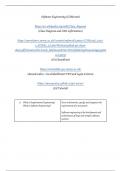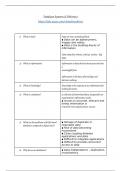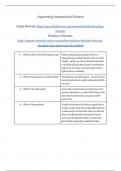University of Surrey (UNIS)
Latest uploads at University of Surrey (UNIS). Looking for notes at University of Surrey (UNIS)? We have lots of notes, study guides and revision notes available for your school.
-
215
-
3
-
13
Courses at University of Surrey (UNIS)
Notes available for the following courses at University of Surrey (UNIS)
Popular books University of Surrey (UNIS)
Latest notes & summaries University of Surrey (UNIS)
Lecture notes for the module 'MAT3004 Introduction to Function Spaces' in the Mathematics course. Topics covered in the notes include: - Metric Spaces - Normed Spaces - Continuity and Convergence - Open and Closed Sets Definitions in pink, formulae and equations in green, examples in blue.
Lecture notes for the module 'MAT3040 Mathematical Ecology and Epidemiology' in the Mathematics course. Topics covered in the notes include: - Single Species Ecology - Harvesting and Fishing - Interacting Species Populations - Predator-Prey Models - Competition and Mutualism Modelling - SIR and SEI Models - Quarantining - Spatial Ecology Definitions in pink, formulae and equations in green, examples in blue.
Lecture notes for the module 'MAT2047 Curves and Surfaces' in the Mathematics course. Topics covered in the notes include: - Vectors and Matrices - Isometric Transformation - Exponentiation - Plane Curves - Frenet-Serret Frame - Curvature - Rotation Number - Fundamental Forms Definitions in pink, formulae and equations in green, examples in blue.
Lecture notes for the module 'MAT1036 Classical Dynamics'. Topics covered in the notes include: - Reference Frames - Displacement and Vectors - Velocity and Acceleration - Mass, Momentum and Forces - Newtons Laws - Gravity - Work and Energy - Systems of Particles - Angular Motion Definitions in pink, formulae and equations in green, examples in blue.
Lecture Notes for the module 'MAT1031 Algebra'. Topics covered in the notes include: - Basics such as proofs, sets, polynomials, divisibility and more - Vectors - Permutations and Cross Product - Groups and Fields Definitions in pink, formulae and equations in green, examples in blue.
Lecture notes for the module 'Advanced Algebra'. Topics covered in the notes include: - Groups - Generators and presentations - Cosets, Products and Quotient Groups - Abelian Groups, Automorphisms and Semi-Direct Products - Groups Actions - Conjugacy in Groups Definitions in pink, formulae and equations in green, examples in blue.
In-depth coverage of all Software Engineering concepts. Requirements engineering, user vs system requirements, functional hierarchies, documentation, testing and design life cycles. User understanding, features, personas and scenarios, actors, user stories, feature creep and lists. Product-based engineering notes and differences, prototyping, waterfall and agile models, extreme programming, test-first principles, incemental development. Scrum and sprints in agile development, backlog management,...
In-depth coverage going over mathematics for computer scientists. Probability, permutations, bionomial and pascals triangle. Axioms, logic and proofs, regular languages and finite automata, sets and venn diagrams and their relationships. In depth coverage of number theory. Strings, concatenation and formal languages. Regular expressions, DFAs, NFAs, Kleene's Theorem, atomic and compound syntax rules. Automata construction in detail, truth tables and boolean algebra, basic natural language proce...
In-depth notes and flashcards going over databases. Models, difference between information and data, scheme architecture and modelling, relationship models. Document and key value databases (Redis, Amazon DynamoDB), graph databases, DMS and DSMS, multi-user access control, backup and integrity management. CRUD, business rules, SQL in detail, mappings and entities. Domains and attributes, operators in SQL and querying. Constraints in databases, EERMs, types of hierarchies, database normalisation,...
In-depth notes covering Object Oriented Programming in Java especially. The three pillars of OOP (Encapsulation, Abstraction, Polymorphism), how the JVM works, bytecode, public and private methods, classes, objects, constructors and their relationships. Basics of fields vs methods, case and UML diagrams and relationship types, access and mutator methods, types of functions, types of variables (local and global scope), strong vs weak typing, database operators, arrays and bounds in Java, data str...


